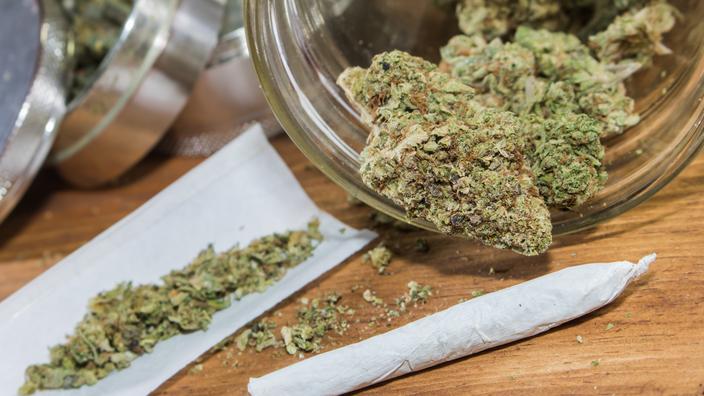For 50 years, the fight against drugs has mainly targeted consumers in a France champion of Europe in the use of cannabis, and now tends to automate the sanction with fines, "
to the detriment of health measures
", according to a published note. Tuesday April 27 by the French Observatory for Drugs and Drug Addiction.
Read also: Has cannabis become a hard drug?
While the executive has made the fight against drug trafficking a priority and Emmanuel Macron wants a "major national debate on drug consumption and its deleterious effects", this OFDT document sheds light on France's trajectory since the country adopted one of the most repressive laws in Europe in 1970.
Drug use is punishable by one year's imprisonment and a fine of 3,750 euros. However, the French are today the European champions of cannabis consumption, with five million annual users, including 900,000 daily smokers. Enough to create a "
mass dispute
", observes the OFDT, with an anti-drug fight that affects users more than traffickers. In 2020, 160,000 people were indicted for infringement of the legislation on narcotics, of which 81% "
are consumers
", the vast majority of them arrested for their use of cannabis, according to the note.
The number of these offenses "
has multiplied by 40
" since 1970, an explosion which "
can be explained above all by the increase in the number of arrests for use
": arrests for this reason "
have increased twice as fast as the procedures for traffic
”. "
The place of the fight against demand in the state budget is more important in France, while in Germany, we devote more funds to fight against traffic than to question users
", explains to the AFP Ivana Obradovic, the deputy director of the OFDT.
The police effort remains painless for the vast majority of the five million annual cannabis smokers: only 4% of them were arrested in 2010, the last year when the statistics specified the drug found during the arrest.
Among this small minority, "
young people under 25
", "
people born abroad
" and the unemployed are over-represented, the document recalls.
Automated sanction
Despite the severity of the law, drug users nevertheless rarely go to prison. To deal with constantly increasing procedures, the courts have tried to automate the sanction, with simplified procedures to relieve the courts. Since the end of the 1990s, it has widely used alternatives to prosecution, which today represent “
two thirds of the guidelines issued
” by the prosecution. Among these alternatives, the OFDT observes "
the gradual elimination of alternative measures with a health dimension
", such as the therapeutic injunction or the referral of users to a care structure. These sanctions, which had increased significantly during the 2000s, “
today represent 7% of the alternatives prescribed to sanction a use offense, the lowest level ever recorded
”. Prosecutors now prefer reminders to the law, used in "
almost all
" cases where an alternative to prosecution is retained.
At the same time, criminal sanctions against users have diversified: judges and prosecutors increasingly resort to fines or awareness-raising courses against drug use, often perceived as a “
disguised fine
” by consumers.
A treatment increasingly similar to that of traffic offenses, completed by the entry into force of a fixed fine for drug use of 200 euros, directly imposed by the police and entered in the criminal record.
Since its creation in September, 70,000 users, mainly cannabis users, have been fined.
To read also: Sarah Halimi case: "Drugs cannot be a license to kill", says Attal
"
The rise of this dynamic of financial penalization has come at the expense of measures with a health dimension, individualized, which have become rare
", observes the OFDT in its report. An evolution which “
seems to contradict the spirit of the law of 1970, which envisaged the user of narcotics as a delinquent but also as a patient requiring possible care.
"According to Ivana Obradovic, we are moving towards"
a harsher application of the law of 1970, since this health dimension is totally ignored
".

